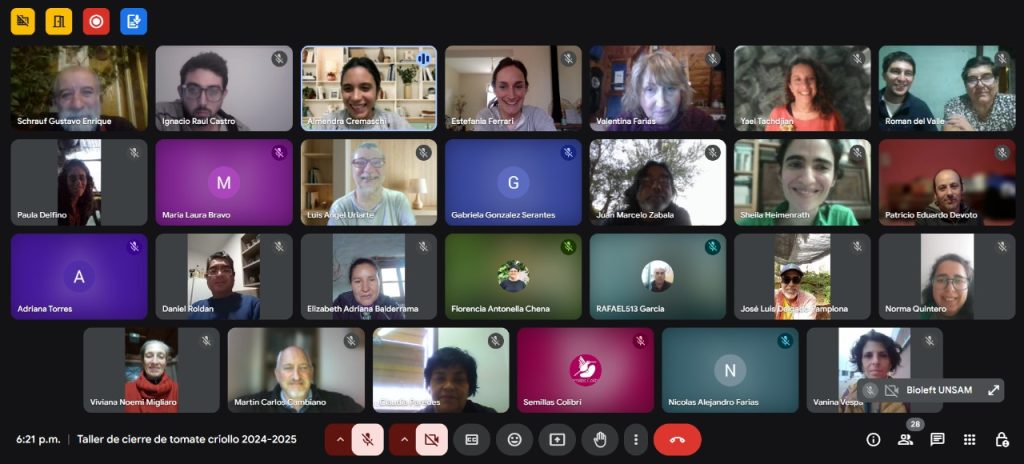This past April, we held the closing workshop for the 2024–2025 campaign of the collaborative evaluation project of Creole tomatoes. Once again, we came together from different regions and experiences to celebrate a collective process that continues to grow, driven by the commitment of gardeners, agroecological producers, researchers, students, and defenders of open-pollinated seeds.
During the gathering, we shared the main learnings and outcomes from the campaign. This year, over 150 seed kits were distributed, including the varieties Aimé, No me olvides, and La Piqui, and in some cases, the Ronita tomato as well. Despite climatic challenges and some germination issues, 40% of the data sheets were fully completed, and there was strong participation in photographic documentation and exchange spaces.
The evaluations showed medium to high performance for the Aimé and No me olvides varieties, and the richness of the collective process was especially valued: the exchange of experiences, mutual support, and the diversity of practices and territories that nourish this work.
The heart of the workshop was in the stories shared by those who actively participated in the campaign. Patricio, an urban gardener from Buenos Aires and a participant for the past three years, highlighted the group’s value as a learning space: “What I practiced the most was observation. When I didn’t understand something, I asked, and that’s where the value of exchange came in.”
From the Minka agroecological cooperative, Paula and Julia shared their experiences with the Creole varieties and the Ronita tomato. Paula emphasized its hardiness and productivity, while Julia described her emotional bond with seeds: “I like seed saving because I feel identified with the tomatoes. This year I had a great harvest, especially with No me olvides.”
Estefanía, from Cipolletti, shared her journey from family farming to connecting with the culinary world. “I grow tasty tomatoes. That’s what I’m after. This year I sold directly to restaurants and to the public, telling the story behind each variety. The Creole tomato sparks a lot of interest,” she said.
From Mexico, Nereida Sánchez of the Semillas Colibrí project spoke about the work of her family farm and their search for a variety adapted to their territory. With over 150 types of tomatoes collected, she continues to evaluate flavor, resistance, and local adaptation in a years-long task: “My goal is to offer native and Creole open-pollinated seeds for urban agriculture.”
Meanwhile, Ignacio Castro and Gustavo Schrauf (FAUBA) shared progress on genetic improvement, crossings with virus-resistant materials, and reflections on commercialization. “The sales channel largely defines the viability of the Creole tomato. Its value lies in its flavor, but also in finding the right place where it is truly appreciated,” they noted.
The event was also an opportunity to preview the new seed extraction tutorial, developed with the Semillas Locales group from La Plata (LIRA), and to present progress on an app being developed to strengthen data recording, community connections, and the visibility of seed guardians.
At Bioleft, we celebrate this closure as a new beginning. We deeply thank those who grow, document, observe, and share. And we renew our commitment to this network that protects, multiplies, and reimagines the future of our seeds.

THANK YOU TO EVERYONE WHO PARTICIPATED IN OUR CAMPAIGN!